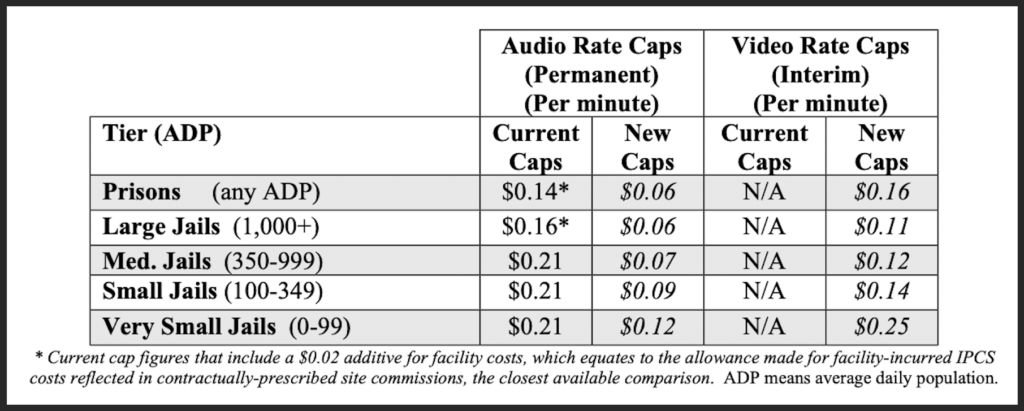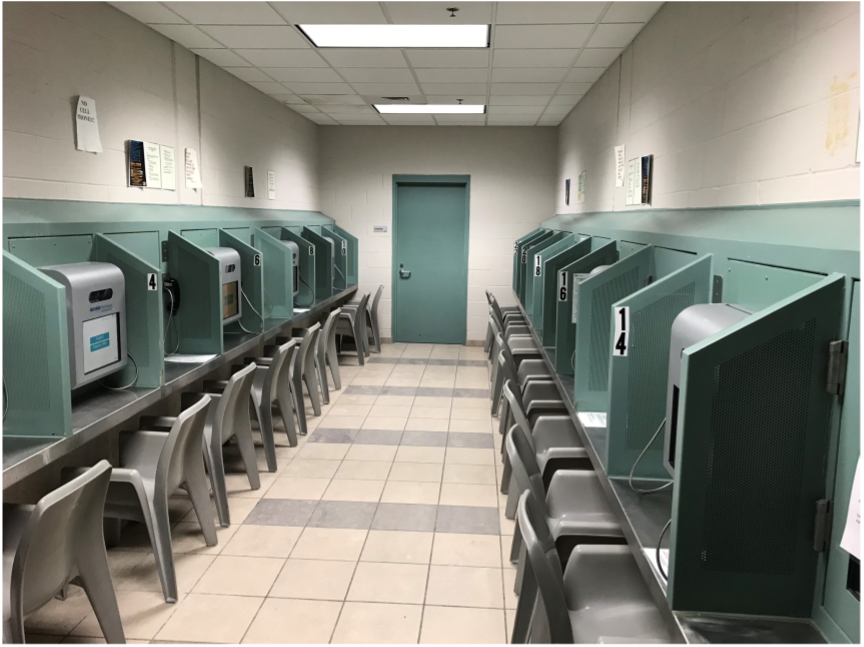The landmark Federal Communications Commission (FCC) regulations poised to bring down costs of phone and video calls for incarcerated people will move forward as planned, despite an onslaught of lawsuits and delay tactics from the corrections industry. The first of the new FCC caps will be enforced January 1, 2025.
On November 18, the United States Court of Appeals for the First Circuit denied separate petitions from Securus Technologies and Pay Tel Communications, both of which had requested a stay of the new regulations while they fight them in court. Both contractors had similarly petitioned the FCC directly, and received denials from the agency in October.
More than a dozen states, several private contractors besides Securus and Pay Tel, and one of the nation’s largest law enforcement associations have so far filed litigation in an effort to delay regulations approve by the FCC in July. Rather than private contractors with monopolies on all incarcerated people’s communication services (IPCS) charging whatever they want for certain services, the FCC will have new regulatory authority under the Martha Wright Reed Act. IPCS subject to the FCC caps include per-minute rates for phone calls; per-use fees tacked onto each phone call; and caps on prices of video visitation, which unlike phone calls have never been subject to caps of any kind.
View this post on Instagram
According to the New Jersey Department of Corrections, in the hours after the First Circuit Court denials Securus informed the department that it was suspending video visits for the next week as it made changes required by the FCC.
JPay, a prominent IPCS provider, was acquired by former rival Securus in 2015. As of at least November 20, users logging into the platform were greeted by a notice of “minor bug fixes and user improvements.” Overhauls were also visible on the Securus, which has its own app and desktop version separate from JPay.
A similar announcement by the Washington Department of Corrections referenced a “system update.” The department did not provide comment in response to Filter‘s inquiry about connection to the FCC caps.
Securus is performing a system update. From Nov. 18 at 6 p.m. PST to Nov. 22 at 6 p.m. PST, Securus Video Connect will be unavailable. Any existing scheduled video calls will be canceled and automatically refunded, and no new video calls can be scheduled during the downtime. pic.twitter.com/EedH52y1Z0
— Washington Corrections (@WACorrections) November 19, 2024
On January 1, the caps will take effect in prisons and jails with an average daily population of over 1,000. Smaller facilities will follow on April 1. Any facility that currently accept kickbacks, regardless of population size, will be the last to switch over so as to have sufficient time to make the adjustment. Those facilities will be subject to the caps starting July 1.

Kickbacks, or “site commissions” as they’re called in the various litigation currently moving through the federal court system, will be banned under the new regulations. The terms refer to a widely entrenched practice in which private contractors like Securus and Pay Tel win a prison or jail phone service contract by offering administration the biggest cut of the profits, which they can generously share without worrying about it cutting into their own profits because everything can be recouped by charging more to use the service.
Additional stakeholders that have so far petitioned and been subsequently rejected by the FCC include IPCS contractors HomeWAV and NCIC Correctional Services, and the National Sheriff’s Association. In October, attorneys general from 14 states jointly sued the FCC contesting the agency’s authority to cap IPCS rates.
Securus, the second-largest IPCS contractor in the US, has filed multiple requests to the FCC and to the courts, all of them so far unsuccessful. In October, the comparatively smaller contractor Pay Tel filed essentially the same complaint that the FCC had rejected from Securus a few days earlier, and argued that the agency should render a different decision because the FCC caps are “founded on several instances of clear error which create a likelihood of reversal on appeal.” Which seems to be a different legal opinion than the one held by the federal circuit court of appeals.
Photograph via Tazewell County Sheriff’s Office




